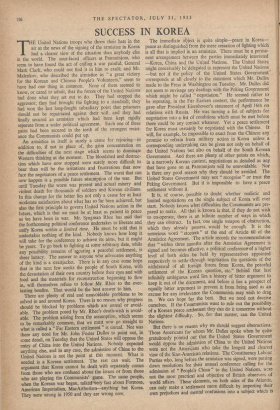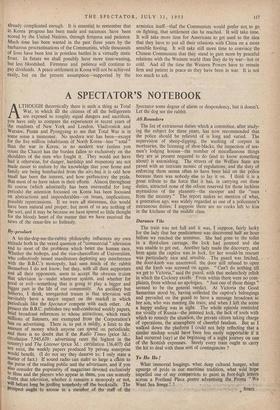SUCCESS IN KOREA
THE United Nations troops who threw their hats in the air at the news of the signing of the armistice in Korea had a clearer view of the situation than anybody else in the world. The sour-faced officers at Panmunjom, who seem to have found the act of ending a war painful; General Mark Clark, who could not find it in him to exult; and Mr. Malenkov, who described the armistice as "a great victory for the Korean and Chinese People's Volunteers," seem to have had one thing in common. None of them seemed to know, or cared to admit, that the forces of the United Nations had done what they set out to do. They had stopped the aggressor; they had brought the fighting to a standstill; they had won the last long-fought subsidiary point that prisoners should not be repatriated against their will; and they had finally secured an armistice which had been kept rigidly separate from a wider political agreement. Each one of these gains had been secured in the teeth of the strongest resist- ance the Communists could put up.
An armistice in itself is surely a cause for rejoicing—in addition to, if not in place of, the grim concentration on the difficulties of the next stage which seems to dominate Western thinking at the moment. The bloodshed and destruc- tion which have now stopped were surely more difficult to bear than will be the irritations and frustrations that now face the negotiators of a peace settlement. The worst that can now happen is a possible future resumption of the war. But until Tuesday, the worst was present and actual misery and violent death for thousands of soldiers and Korean civilians. In this change for the better lies not only a cause for at least moderate satisfaction about what has so far been achieved, but also the first principle to govern United Nations action in the future, which is that we must be at least as patient in peace as We have been in war. Mr. Syngman Rhee has said that the forthcoming political conference undertakes to liberate and unify Korea within a limited time. He must be told that it undertakes nothing of the kind. Nobody knows how long it will take for the conference to achieve its aims, but it might be years. To go back to fighting at some arbitrary date, while any possibility remains of %curing a peaceful settlement, is sheer lunacy. The answer to anyone who advocates anything of the kind is a straitjacket. There is in any case some hope that in the next few weeks the people of South Korea, with the devastation of their own country before their eyes and with food and the materials for reconstruction beginning to flow in, will themselves refuse to follow Mr. Rhee to the ever- lasting bonfire. That would be the best answer to him.
There are plenty of real and unavoidable problems to be solved in and around Korea. There is no reason why progress should be blocked by problems which are unreal or avoid- able. The problem posed by Mr. Rhee's death-wish is avoid- able. The problem arising from the assumption, which seems to be remarkably common, that we must now go straight to what is called a "Far Eastern settlement" is unreal. Nor was there any need for Mr. John Foster Dulles to point out, in some detail, on Tuesday that the United States will oppose the entry of China into the United Nations. Nobody expected anything else, and in any case, the admission of China to the United Nations is not the point at this moment. What is needed is a Korean settlement. The rest can wait. The argument that Korea cannot be dealt with separately comes from those who are confused about the issues or from those who are playing the Communists' game. The same people, when the Korean war began, talked-Very fast about Formosa, American Imperialism, MacArthurism—anything but Korea. They were wrong in 1950 and they are wrong now. The immediate object is quite simple—peace in Korea— peace as distinguished from the mere cessation of fighting which is all that is implied in an armistice. There must be a perma- nent arrangement between the parties immediately interested —Korea, China and the United Nations. The United States might conceivably be delegated to represent the United Nations —but not if the policy of the United States Government corresponds at all closely to the statement which Mr. Dulles made to the Press in Washington on Tuesday. Mr. Dulles did not seem to envisage any dealings with the Peking Government which might be called "negotiation." He seemed rather to be repeating, in the Far Eastern context, the performance he gave after President Eisenhower's statement of April 16th on relations with Russia. He was turning a list of subjects for negotiation into a list of conditions which must be met before there could be any contact whatever. Yet a peace settlement for Korea must certainly be negotiated with the Chinese. It will, for example, be impossible to exact from the Chinese any promise to refrain from military action in Korea unless a corresponding undertaking can be given not only on behalf of the United Nations but also on behalf of the South Korean Government. And there are plenty of other points on which, in a narrowly Korean context, negotiations as detailed as any that have gone on at Panmunjom will be unavoidable. Nor is there any good reason why they should be avoided. The United States Government may not " recognise " or trust the Peking Government. But it is impossible to have a peace settlement without it.
It is, of course, possible to doubt whether realistic and limited negotiations on the single subject of Korea will ever start. Nobody knows what difficulties the Communists are pre- pared to make. All that is known is that, if they do not wish to co-operate, there is an infinite number of ways in which they can obstruct. In fact, one single weapon of obstruction, which they already possess, would be enough. It is the notorious word " etcetera " at the end of Article 60 of the Armistice Agreement. The article records the recommendation that "within three months after the Armistice Agreement is signed and becomes effective, a political conference of a higher level of both sides be held by representatives appointed respectively to settle through negotiation the questions of the withdrawal of all foreign forces, from Korea, the peaceful settlement of the Korean question, etc." Behind that last infinitely ambiguous word lies a history of bitter argument to keep it out of the document, and before it lies a prospect of equally bitter argument to prevent it from being used as an excuse for any irrelevance the Communists may wish to drag in. We can hope for the best. But we need not deceive ourselves. If the Communists want to rule out the possibility of a Korean peace settlement they can do it tomorrow without the slightest difficulty. So, for that matter, can the United Nations.
But there is no reason why we should suggest obstructions. Those Americans for whom Mr. Dulles spoke when he quite gratuitously pointed out that the United States Government would oppose the admission of China to the United Nations were not the Americans who take the longest and clearest view of the Sino-American relations. The Constituency Labour Parties wbo, long before the armistice was signed, were putting down resolutions for their annual conference calling for the admission of "People's China" to the United Nations, were not the most practical and objective of British observers of world affairs. These elements, on both sides of the Atlantic, can only make a settlement more difficult by importing their own prejudices and mental confusions into a subject which is already complicated enough. It is essential to remember that m Korea progress has been made and successes have been scored by the United, Nations, through firmness and patience. Much time has been wasted in the past three years by the barbarous procrastinations of the Communists, while thousands of lives have been lost in pointless battles in a virtually static front. In future we shall possibly have more time-wasting, but less bloodshed. Firmness and patience will continue to pay dividends. A peace settlement in Korea will not be achieved easily, but on the present assumption—supported by the armistice itself—thaf the Communists would prefer not to go. on fighting, that settlement Can be reached. It will take time. It will take more time for Americans to get used to the idea that they have to put all their relations with China on a more sensible footing. It will take still more time to convince the Chinese Communists that they stand to, gain more by peaceful relations with the Western world than they do by war—hot or cold. And all the time the Western Powers have to remain firm and patient in peace as they haVe been in war. It is not too much to ask.



































 Previous page
Previous page